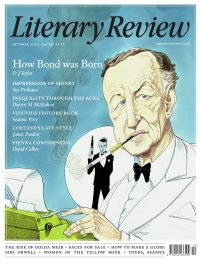Martin Vander Weyer
Man Who Fell to Earth
Elon Musk
By Walter Isaacson
Simon & Schuster 688pp £28
The opportunity to spend two years shadowing Elon Musk, the South African-born entrepreneur behind Tesla cars and SpaceX rockets and owner, since October last year, of Twitter (now renamed X), would be a fascinating but daunting prospect for any writer. The veteran biographer and journalist Walter Isaacson, whose previous subjects have ranged from Leonardo da Vinci to Henry Kissinger, accepted the challenge and has produced a highly readable portrait of a very unusual personality.
Charismatic but rebarbative, rich beyond dreams but restlessly unhappy, intellectually gifted but bereft of conventional social skills, Musk is truly an original. It is a considerable achievement on Isaacson’s part to have persuaded this reviewer – not generally in tune with big-ego tech titans – to adopt a more sympathetic view of Musk and set aside much of the familiar media caricature of him.
The first fact best discarded, in trying to understand what makes Musk tick, is his status as one of the richest people in the world – jockeying for that position with the French luxury goods tycoon Bernard Arnault and the Amazon founder Jeff Bezos, who also happens to be Musk’s hottest rival in rocketry. Gigantic wealth, generated as a by-product of investors’ enthusiasm for Tesla shares, is not what motivates Musk at all. So little does it excite him that in 2020 he decided to sell all his homes, including mansions in Los Angeles and Silicon Valley, because, he said, the label ‘billionaire’ had become ‘a bad thing. They’ll say, “Hey, billionaire, you’ve got all this stuff.” Well, now I don’t have stuff, so what are you going to do?’
After this, he nested in a small rented house in Boca Chica, Texas, close to his SpaceX facility, where his habitual way of unwinding was to play violent video games late into the night. Occasionally he borrowed other houses from friends and eventually he called in the architect Norman Foster

Sign Up to our newsletter
Receive free articles, highlights from the archive, news, details of prizes, and much more.@Lit_Review
Follow Literary Review on Twitter
Twitter Feed
It wasn’t until 1825 that Pepys’s diary became available for the first time. How it was eventually decrypted and published is a story of subterfuge and duplicity.
Kate Loveman tells the tale.
Kate Loveman - Publishing Pepys
Kate Loveman: Publishing Pepys
literaryreview.co.uk
Arthur Christopher Benson was a pillar of the Edwardian establishment. He was supremely well connected. As his newly published diaries reveal, he was also riotously indiscreet.
Piers Brendon compares Benson’s journals to others from the 20th century.
Piers Brendon - Land of Dopes & Tories
Piers Brendon: Land of Dopes & Tories - The Benson Diaries: Selections from the Diary of Arthur Christopher Benson by Eamon Duffy & Ronald Hyam (edd)
literaryreview.co.uk
Of the siblings Gwen and Augustus John, it is Augustus who has commanded most attention from collectors and connoisseurs.
Was he really the finer artist, asks Tanya Harrod, or is it time Gwen emerged from her brother’s shadow?
Tanya Harrod - Cut from the Same Canvas
Tanya Harrod: Cut from the Same Canvas - Artists, Siblings, Visionaries: The Lives and Loves of Gwen and Augustus John by Judith Mackrell
literaryreview.co.uk